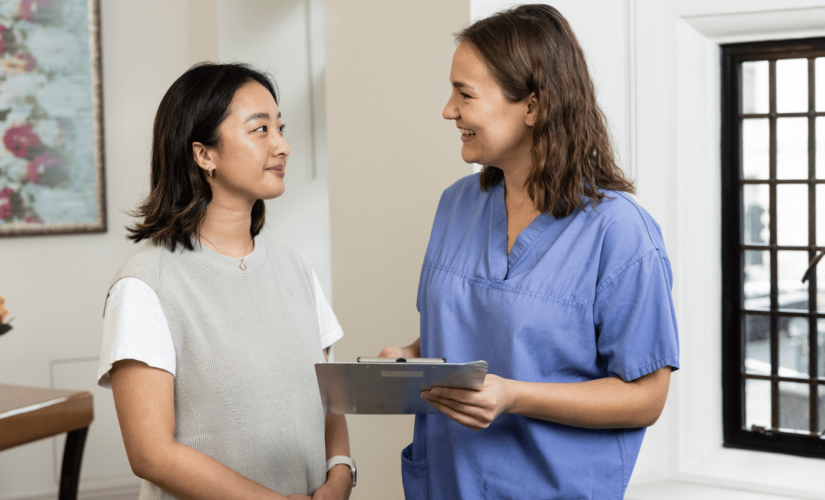fertility preservation Giving you options for the future.
We recognise making the decision to take control and preserve your fertility is empowering, but it can also leave a lot of unanswered questions. We’ll take the time to really understand both your current situation and how fertility preservation may help you build a future family.
Fertility preservation at The Evewell
Total transparency

Open and honest conversations
We only believe in open and honest recommendations, and this also applies to treatments such as fertility preservation.
During your initial consultation, we’ll work together to find the best fertility preservation plan for your current lifestyle and future plans.
This may include egg freezing, embryo banking or sperm freezing. Either way, you will be fully supported throughout your decision making process and journey.
Support and guidance

With you every step of the way
We understand that making the decision to freeze your eggs can be a big step into the unknown.
Our team have been trained to ensure sensitivity and that individual circumstances are considered during appointments.
We offer slightly longer appointment times, to ensure you’ve been able to ask all the questions you may have, and if you’re having treatment on your own, our team will always make sure no reference to a partner is made and you’re welcome to bring someone with you to your appointments.
Arming you with the facts

Knowledge is power, and this is especially important with your future fertility
Unique to The Evewell is allowing all patients access to our entire team, including the embryology team, who will be fully involved in your journey.
During this meeting, usually before you commence your treatment, the team will take time to explain how the sperm freezing process works, and the differences between freezing eggs and embryos, and which is most likely to result in a pregnancy when you are ready to start building your family.
Reasons to preserve your fertility
What happens during an egg freezing cycle?
We know that undergoing fertility treatment can be an anxious and stressful time. Our team will guide and support you throughout your journey whilst ensuring that they deliver first-class clinical results.
Step 01
Individualised Plan
Step 01
Individualised Plan
Once we have discussed your future family plans, we design an individualised treatment plan to deliver the best possible results for you.
You’ll then spend time with one of our specialist fertility nurses who will guide you through your individualised treatment plan and be on hand to provide you with care and support throughout your journey.
Step 02
On your schedule
Step 02
On your schedule
We do everything we can to work around your life and your cycle. Only when you’re ready, your fertility preservation treatment will start.
This means no extra hormone medication to align your cycle with our schedules, we just ask for you to call us when your period starts. This might mean more work for us, but it means less stress on your body.
Step 03
Monitoring
Step 03
Monitoring
For the case of female fertility preservation, once you start your hormone injections to stimulate your ovaries, your follicle growth, egg development, and hormone levels will be closely monitored by your consultant.
And even though you have one consultant, you benefit from the entire team’s experience and knowledge when they review your progress at our daily ‘All Hands’ meeting.
Step 04
Egg Collection
Step 04
Egg Collection
Wherever possible, your consultant will perform your egg collection, working closely with the embryology team.
Your retrieved eggs will be evaluated and cryopreserved by an embryologist the same day. If you are opting to create and freeze embryos, you will be updated by the embryology team on Day 5.
Step 05
Fertility aftercare
Step 05
Fertility aftercare
Once you’ve had your egg collection, you will have a follow-up consultation with your doctor to review your treatment.
When you’re ready to discuss starting your family, you will arrange a meeting with your consultant to discuss the best plan of action for your sperm, or egg fertilisation, if you don’t have embryos stored, and possible investigative tests before any embryo transfer to help maximise your chances of pregnancy.
How much does fertility preservation cost?
We know that fertility treatments are not only an emotional commitment but also a financial one too, so we’ve made sure our prices are competitive.
We always recommend to patients that when comparing prices between clinics they ensure that they have prices for all the elements that a clinic expects a patient to pay for.
Contact one of our Patient Services team today to further discuss treatment costs.
Our team of experts are only one call away to offer support and help
Frequently asked questions about Egg Freezing
The time it takes to complete one cycle of egg freezing depends on your recommended treatment. However, for most women, one cycle of egg freezing will take between two to four weeks.
Day 1: Call our nursing team on the first day of your cycle when you have fresh red bleeding before 6pm. They will book in an ultrasound scan and blood test for the next day.
Day 2: You will come into the clinic for your blood test and scan. Your nurse will then confirm that you are ready to start your medications which you will take daily.
Day 4-10: You will come into the clinic every 2-3 days for an ultrasound scan to monitor your cycle.
Day 12: Typically on Day 12 you will have a trigger injection in preparation for your egg collection.
Day 14: On the day of egg collection you will come to the clinic for the consultant to perform the egg collection. During the cycle you will have daily contact with our nursing team and patient services team who will guide you through the process, support your journey and give you any assistance you need. Your cycle will be monitored daily by the consultant, embryologist and nurse.
In preparation for your treatment, the doctor may recommend a long protocol of stimulation. During this regime, your natural hormone production is suppressed to enable the doctor to have complete control of the stimulation of your ovaries and the time of ovulation. This is done by daily medication, administered by either an injection or nasal spray.
We understand that the thought of administering medication yourself at home can be a daunting one. Therefore, before you start treatment you will have a consultation with one of our experienced nursing team who will be able to explain all medications, demonstrate in detail how to administer them and teach you how to do this at home.
This depends on how you are responding to the medication. During the stimulation stage, you’ll attend appointments for both blood and ultrasound scans every 2-3 days, so your consultant can continually review your progress through the stimulation phase and personalise your treatment. We’ll work with you to ensure these appointments can be managed around your day-to-day life.
Your egg collection will be done under sedation, at either Harley Street or West London, depending on where your consultant is based. You won’t be awake for the procedure and you will be considered a day patient, however, you will need someone to help take you home as you won’t be able to drive or use public transport.
Your eggs, or embryos if you chose to use a partner or donor sperm, will be frozen via a vitrification process that rapidly super-cools the eggs or embryos, storing them in a glass-like state preventing the formation of ice crystals which destroy them.
We would expect 95% or more of good quality eggs which have been vitrified to survive when being thawed for treatment. Eggs that survive the thawing process quite often progress as though they were never vitrified, achieving fertilisation rates, embryo quality and pregnancy rates comparable to fresh ICSI-IVF cycles.
Before and during your cycle we advise that you maintain a healthy and balanced diet and take a Folic Acid and Vitamin D supplement. During your cycle you need to avoid smoking, alcohol and caffeine. Light exercise, such as walking, pilates and yoga are all suitable but you should avoid high-intensity exercise.






